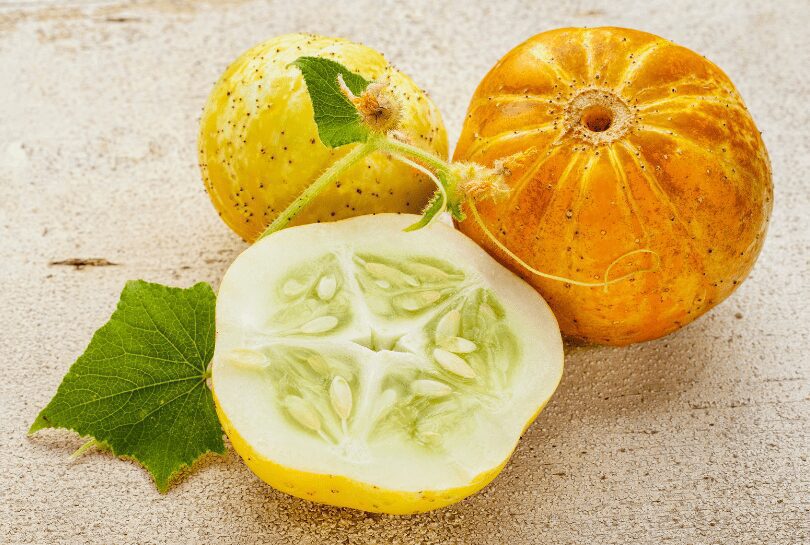
When you’re wondering how to grow a Lemon Cucumber, you’re probably wondering how to keep it healthy. It would help to familiarize yourself with essential things, from watering to fertilizing to dealing with pests. Regardless of the type of lemon cucumber you grow, follow the guidelines in this article. Below are a few helpful tips to help your plant grow strong, healthy, and productive.
Growing Lemon Cucumbers
Start lemon cucumber seeds indoors a few weeks before the last frost for the best results. Sow seeds ½ inch deep and 12-18 inches apart. Then, after all danger of frost has passed, transplant seedlings into your garden, spacing rows 4-5 feet apart.
Choose a spot with full sun and rich, well-draining soil. A raised bed with a good quality potting mix is ideal for lemon cucumbers. Alternatively, amend your native soil with compost or aged manure to improve drainage. Aim for a soil pH between 6.0 and 7.0.
Lemon cucumber plants require moist soil. Water at least twice weekly, providing about an inch of water in total. Avoid watering the leaves, as this makes them prone to mildew. Focus on watering at the base of the plant.
For continuous harvests, fertilize your lemon cucumber plants every 2-3 weeks with a balanced fertilizer diluted according to package instructions. Organic gardeners can use a fish emulsion or compost tea instead.
Lemon cucumber vines are vining plants that benefit from support. Install a trellis or tomato cage before planting to give them something to climb on.
Harvest & Use
Harvest lemon cucumbers when they reach the size of a lemon and are still bright yellow with no signs of softening. Enjoy them fresh in salads, dips, or pickle them for a delightful addition to winter meals.
Watering
Lemon cucumbers need about an inch of water per week. For the healthiest plants, water deeply and less frequently rather than shallow, daily watering. During periods of hot, dry weather, they may need extra attention.
Fertilizing
There are many benefits to fertilizing your lemon cucumber. The soil should have balanced NPK (nitrogen, phosphorus, potassium) levels.
Cucumbers do not grow well in soils that have too much nitrogen. They often produce leaves and a few blossoms primarily.
By following the instructions on the label, you’ll ensure your lemon cucumbers thrive in your yard.
For best results, use an organic fertilizer with a balanced blend of chicken manure, blood meal, and bone meal.
Commercial fertilizers contain too much nitrogen and aren’t ideal for lemon cucumbers.
Once the fruit is soft, you can harvest it. Add a few other vegetables, such as lettuce or cauliflower, to promote faster fruiting.
Pests
Keep an eye out for cucumber beetles, aphids, and powdery mildew. Manage these issues with insecticidal soap, neem oil sprays, or organic alternatives.
Cucumber Lemon Water
Aside from the taste, cucumber lemon water has many health benefits. Besides being tasty, it helps balance blood sugar levels and lowers blood pressure. A cup of cucumber lemon water is an excellent replacement for sugary drinks and can help you lose weight.
When made into a smoothie, lemon cucumber water will be a refreshing and healthy drink for the body. Cucumber and lemon in water will also improve your immune system. The combination of lemon and cucumber is like a mini-spa.
Lemons contain high levels of Vitamin C and other antioxidants, and cucumbers are loaded with fiber and soluble dietary fiber. Both are great for the complexion and are perfect for hydrating the skin and digestive system. Add a slice of cucumber to your water to increase its benefits.
Conclusion
Lemon cucumbers are a delightful and easy-to-grow addition to any summer garden. Their mild flavor and refreshing crunch make them a versatile favorite. If you’re lucky enough to live in a region with mild winters, you might even experiment with extending your harvest by utilizing sunshades and starting seeds earlier.
Whether you’re seeking heirloom slicing cucumbers or want to explore the unique lemon cucumber, remember to factor in days to germinate and days to harvest when planning your garden, especially if you experience cold winters.
























